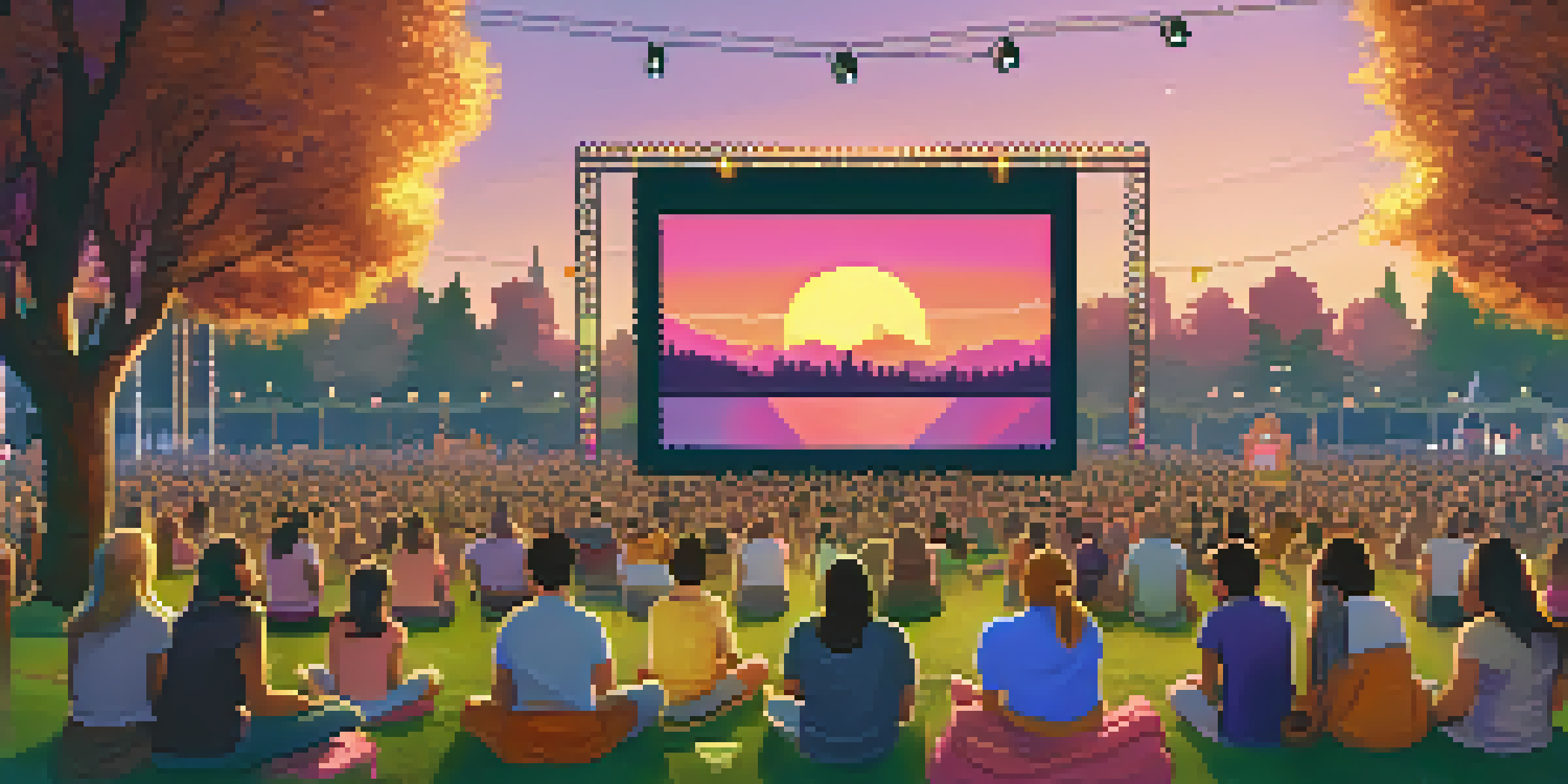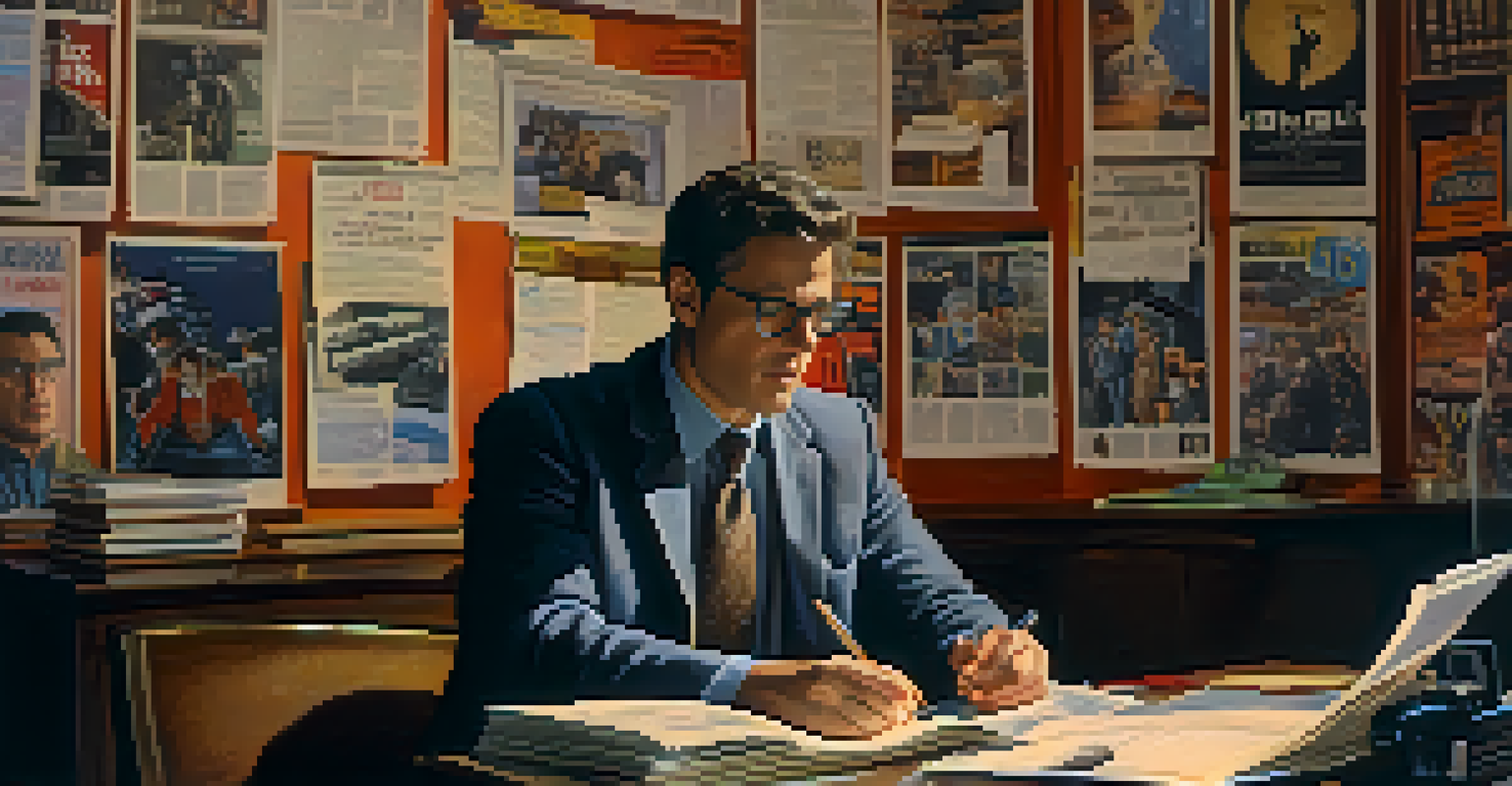The Impact of Film Critique on Public Perception of Cinema

Understanding Film Critique and Its Purpose
Film critique serves as a bridge between filmmakers and audiences, providing insights into a film's themes, techniques, and cultural significance. It helps viewers to analyze and appreciate the art of cinema beyond mere entertainment. By dissecting elements like cinematography, direction, and storytelling, critiques invite audiences to engage more deeply with films.
Film criticism is a way of appreciating cinema, conveying insights and observations that enhance our viewing experience.
Moreover, critiques can serve as a valuable guide for viewers who may feel overwhelmed by the sheer volume of films available today. With countless options at their fingertips, audiences often rely on critics to highlight what’s worth watching. This guidance can enhance their viewing experience, allowing them to discover hidden gems they might otherwise overlook.
Ultimately, the aim of film critique is not just to evaluate but to enrich the audience's understanding of cinema. By encouraging thoughtful discussion and exploration, critiques foster a more informed and discerning audience that appreciates the nuances of filmmaking.
The Role of Critics in Shaping Public Opinion
Critics wield significant influence over public perception, often serving as the cultural gatekeepers of cinema. Their reviews can propel films to success or diminish their visibility, impacting box office performance and audience interest. For instance, a glowing review from a reputable critic can spark a viral conversation about a film, leading to increased ticket sales and viewership.

Furthermore, critics often highlight social, political, or cultural themes within films, prompting audiences to consider broader issues. This insightful commentary can lead to a deeper reflection on societal norms and values, encouraging viewers to see films as more than just entertainment. In this way, critiques can inspire meaningful conversations that extend beyond the theater walls.
Film Critique Enhances Viewing Experience
Film critiques help audiences appreciate cinema beyond entertainment by analyzing themes, techniques, and cultural significance.
However, critics also face the challenge of personal bias, which can color their reviews and, consequently, public perception. Audiences may gravitate towards critics whose tastes align with their own, creating echo chambers that can distort a film's true impact. Thus, it is vital for viewers to seek out diverse opinions to form a well-rounded perspective.
Social Media's Impact on Film Critique
In today’s digital age, social media has transformed the landscape of film critique. Platforms like Twitter, Instagram, and YouTube allow anyone to share their thoughts and reviews, democratizing the critique process. This shift means that audiences now have access to a broader range of voices and perspectives, which can enrich their understanding of a film.
The critic is a man who knows the way, but can't drive the car.
However, the immediacy of social media can also lead to hasty judgments based on limited information. A quick tweet or post might sway public opinion before a film even has a chance to be properly evaluated. This phenomenon can result in 'cancel culture' where films are dismissed unfairly based on a few negative reviews, regardless of their artistic merit.
Moreover, the viral nature of social media means that a single critic's opinion can reach millions in mere moments. This can amplify certain critiques while overshadowing others, further influencing what films gain traction in the public eye. As a result, audiences must navigate this complex landscape, discerning which opinions hold weight and which might be driven by trending topics rather than substance.
Audience Reception and Its Relationship with Critiques
The way audiences receive a film can be heavily influenced by the critiques it receives. If early reviews are predominantly negative, potential viewers might be deterred from watching altogether, regardless of their own interests. Conversely, positive reviews can create buzz and excitement, making audiences more inclined to see a film they might have otherwise skipped.
This phenomenon highlights the power of expectation in shaping audience experiences. When viewers enter a theater with preconceived notions based on critiques, their enjoyment may be swayed by those expectations. For example, if a film is marketed as a 'masterpiece' but fails to meet those lofty standards, audiences may leave feeling disappointed.
Critics Shape Public Perception
Critics serve as cultural gatekeepers whose reviews can significantly influence a film's success or failure at the box office.
Ultimately, the relationship between audience reception and critiques is a delicate dance. While critiques can guide perceptions, individual experiences will always vary. Audiences must remember that their unique tastes and preferences should also play a significant role in how they engage with cinema.
The Evolution of Film Critique Over Time
Film critique has evolved significantly since the first films graced the silver screen. In the early days, critiques were often limited to a few influential voices, such as newspaper critics. However, as cinema has grown into a global industry, the range of voices and platforms for critique has expanded dramatically, reflecting diverse cultural contexts and experiences.
Today, film critique encompasses various formats, including podcasts, blogs, and video essays, allowing for a richer exploration of films. This evolution not only democratizes the critique process but also invites creative expressions in how films are discussed and analyzed. Critics now have the freedom to explore personal narratives and share unique perspectives that resonate with broader audiences.
As the world of cinema continues to change, so too will the methods and approaches to critique. This adaptability ensures that film critique remains relevant, engaging, and reflective of the times, continuing to shape how audiences perceive and appreciate cinema.
The Influence of Film Festivals on Critiques
Film festivals play a pivotal role in shaping the landscape of film critique. By showcasing a diverse array of films, festivals provide critics with the opportunity to discover new talent and innovative storytelling. This exposure often leads to heightened interest in films that may not have received mainstream attention, allowing critics to champion underrepresented voices.
Moreover, films that receive accolades at festivals can experience a significant boost in public perception. Awards can validate a film's quality and importance, influencing audience interest and engagement. For example, a film that wins the Palme d'Or at Cannes often garners immediate global attention, with critics and audiences alike eager to see what all the fuss is about.
Social Media Changes Critique Landscape
The rise of social media democratizes film critique, allowing diverse voices to emerge while also leading to potential hasty judgments.
However, the festival circuit also introduces its own set of challenges. Films that may excel in a festival environment might not resonate as well with general audiences. This disconnect can lead to disparities in critiques that highlight the complexities of film appreciation, reminding us that the context in which a film is viewed can greatly impact its reception.
Looking Ahead: The Future of Film Critique
As the world of cinema continues to evolve, so too will the methods of film critique. The rise of new technologies, such as virtual reality and interactive storytelling, will likely alter how critics approach their analyses. This evolution promises to create new opportunities for immersive experiences that challenge traditional viewing norms.
Additionally, as global cinema becomes more interconnected, critiques will increasingly reflect diverse cultural perspectives. This shift will enrich the conversation around film, allowing audiences to engage with stories from around the world. As critics embrace this global viewpoint, audiences will gain a broader understanding of cinema's potential to reflect the human experience.

Ultimately, the future of film critique lies in its ability to adapt and grow alongside the medium itself. By fostering open dialogue and encouraging exploration, critics can continue to shape public perception in ways that enhance appreciation for the art of cinema.